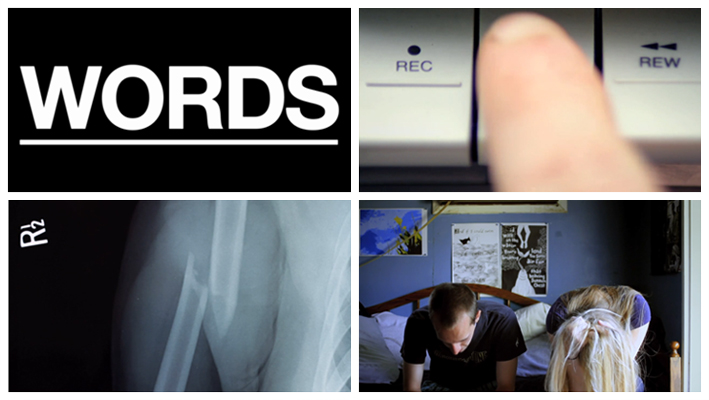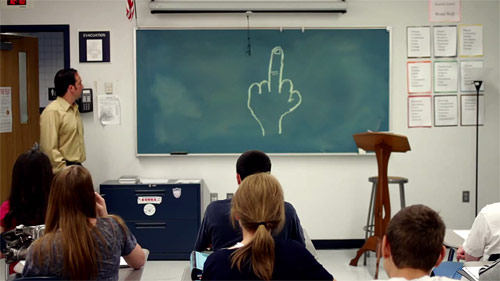The chief pleasure of the filmmaking team Everynone‘s “Words” is the experience of assembling the pieces of the film, the montage, together like some massive jigsaw puzzle your mom got at a yard sale, sans box with overall picture to guide you and with, continually, the possibility of a missing piece or two. So watch it first, then proceed to this “introduction” as “aftroduction.” Afterword sounds so final, and I think you’ll want to watch this is again.
Watched it? Experienced it? Then read on.
Watching “Words” is slippery, a luge of sequitur with a side of slip and slide of the tongue. The film moves from scene to scene through association, one replacing the other in a chain. The links are sometimes through homonyms (various visual meanings for the word “play”) and homographs (words with the same pronunciation, but different spelling, like “brake and “break”), sometimes through complex scenes (the image of a trumpet player which first signifies “play,” but then continues until he inhales and shifts the chain to the word “blow.” These links form a pattern that may not be immediately discernible but reveals itself as the montage slips by.
The chain is one level simple: “play / blow / break / brake / break-up / split / run / runway / fly etc.” And yet it rises above gimmick, elevates itself above the simple chain of words. I laughed at things that are “not going to fly.” I got a little misty at the “split.” These emotions, too, were linked.
This process of the mind slipping along with the images seems amenable to how our minds work, a familiar game of charades capitalizing on how familiar our brains are with this kind of associative work. Sigmund Freud, in his Psychopathology of Everyday Life, argued that slips of the tongue are related to the work of ‘condensation’ as he identified it in Interpretation of Dreams. He added in Psychopathology that “a similarity of any sort between two elements of the unconscious material – a similarity between the things themselves or between their verbal presentations – is taken as an opportunity for creating a third, which is a composite or compromise idea” (100). We are not just seeing the individual scenes here, they, at several points combine with our own (unconscious) experience to create another level of experience.
Dynamically this sounds very similar to Sergei Eisenstein’s theories around intellectual montage, where he argued for a combining of visual images to create conflict. In “Beyond the Shot,” Eisenstein, in looking at how images can be brought together, noted that “the simplest juxtaposition of two or three details of a material series produces a perfectly finished representation of another order, the psychological . . . the concept blossoms forth immeasurably in emotional terms” (16). What links these scenes then is not just the connection of the chain of words. It is also a chain of emotional links. We experience these mostly unspoken “Words” emotionally, personally and experientially.
“Words” is just one of several shorts made by the filmmaking team Everynone. As filmmakermagazine.com explains, the team has “been creating witty and allusive short films to accompany the popular WNYC radio program Radiolab, heard on more than 300 public radio stations around the country. Radiolab explores science and philosophy in the guise of radio theater, mixing music and sound effects into presentations that thrillingly veer from the pedagogical to the personal.”
Everynone is a filmmaking team, according to their website “located in the redwood forest.” The team is made up of Daniel Mercadante, Will Hoffman, and Julius Metoyer III. According to their mission statement, “Everynone works primarily with non-actors to capture life as it is, carefully framed and distilled. Their mission is to uncover the beauty in the mundane and everyday; to band the emotion and aesthetic around one simple core idea. They play with the lines between documentary, fiction and experimental cinema to craft films that focus on concepts and feelings above all else.”
–R W Gray



Thanks, Rob! This was fun to watch and I love the Eisenstein quotation!
I think I fell (slid, descended, dove) off the Numero Cinq list, as I haven’t gotten a notice of new material in a long time. Since I am loving the copula spiders in all their variety, I took a look today, and found this fascinating film. Thanks.